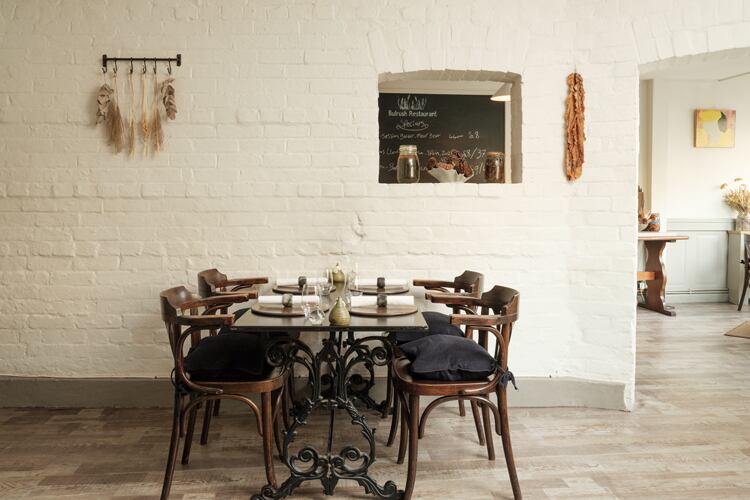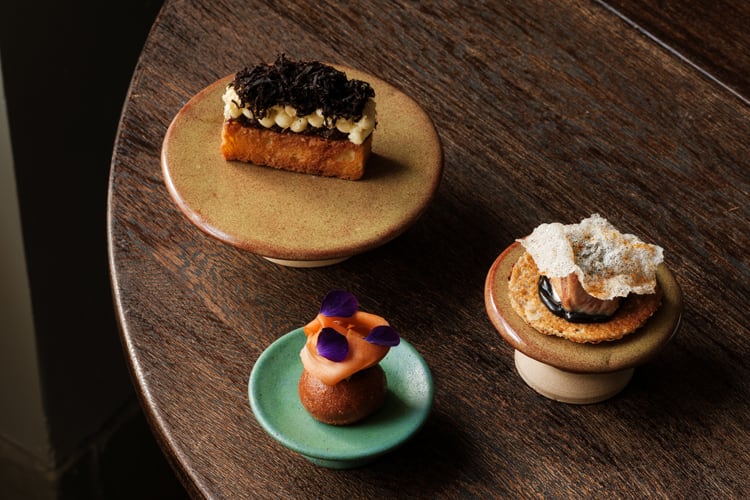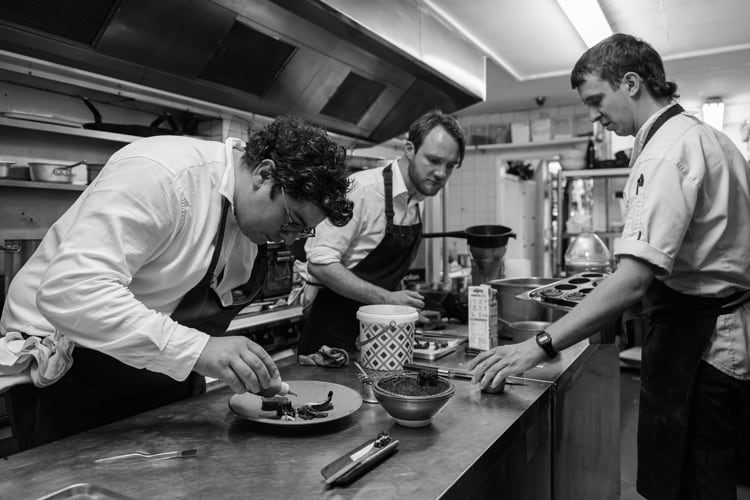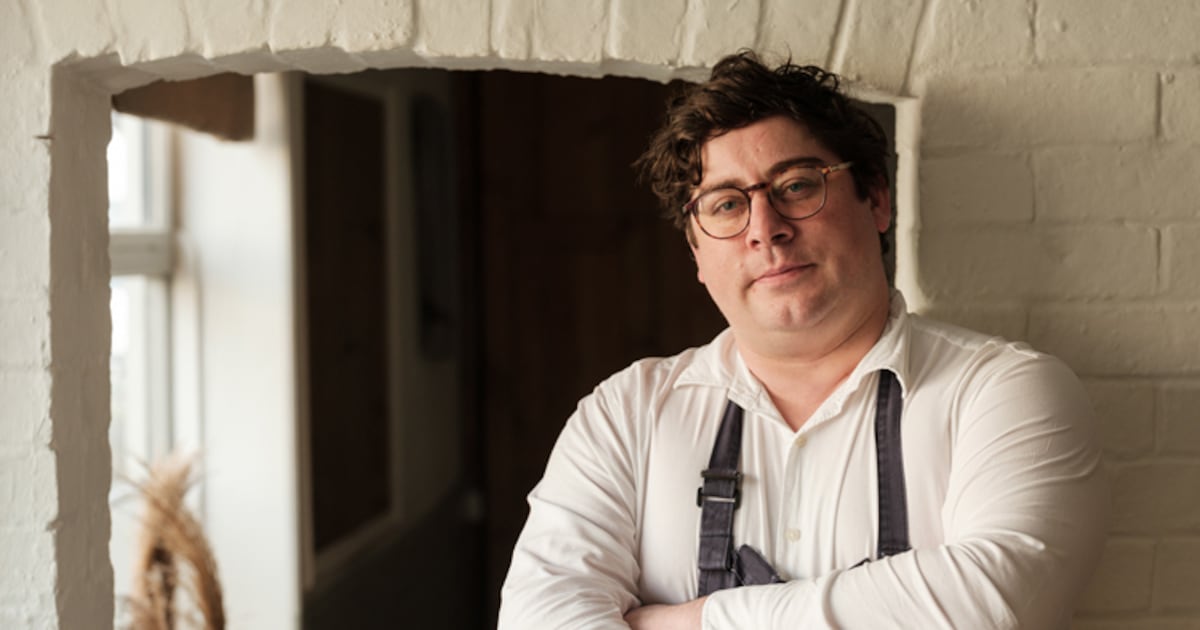Congratulations on nearly a decade of Bulrush. How are things?
I love Bulrush, but it doesn’t make any money. I was naïve when I set this place up. I didn’t really think about generating a profit. I just wanted to cook. To be honest, I’m a little surprised I’m still here.
Lots of Michelin-starred restaurants in Bristol have closed over the past few years. What does that say about the city’s dining scene?
It’s a tough market. Chefs of my sort of level were doing okay up until around Covid but a lot of them either opted to close during the pandemic or change things up. Due to this, we enjoyed an influx when we reopened and started to make a half-decent profit. But that only lasted a year or so. Last year we were 35% down on the previous year.
 Inside the Bulrush dining room (©Dave Watts)What do you think the problem is?
Inside the Bulrush dining room (©Dave Watts)What do you think the problem is?
The fact that Bristol is no longer considered a hotspot for fine dining doesn’t help (at one point the city had five Michelin-starred restaurants). We used to get a lot of visitors to the city who were also going to Casamia, Wilks, Paco Tapas and Birch (all now closed). The locals like having top restaurants but they often don’t want to spend much. This has seen the rise of a lot of small plates places. They often make tasty food and I enjoy going to them on my days off. But it is frustrating because we are using far better ingredients, doing more sophisticated things with them and are, actually, only charging a little bit more. Our nine-course tasting menu is £90 and we also offer a shorter early evening menu for £65 and a lunch menu for £48.
Tell us about your background
I’m originally from a small village in Derbyshire. I wasn’t very academic at school, so my mum got me on the Specialised Chef Scholarship down in Bournemouth (which is run by the Academy of Culinary Arts). Albert Roux ended up being my sponsoring chef so I ended up working across the Roux Fine Dining business. I helped launch Roux at Parliament Square with Dan Cox. Albert was a real character but you never knew whether he was going to hit you with his cane or praise you.
Why did you choose Bristol when you struck out on your own?
It was my dad who came across the site that is now Bulrush (in Cotham a little to the north of the city centre). Unusually for a restaurant, it is a freehold. It was a bit of an ugly duckling. It’s not really the right shape and the kitchen is so small you can only get three chefs in there. At the time Bristol had a lot of top-end places but I thought I could offer something different. I launched Bulrush with my then partner but we ended up splitting up because she decided it wasn’t for her. I’d worked in hospitality all my life but she was new to it. It was like being left on your own with the baby. But I had a very strong team at the time so we got through it.
When did you get your Michelin star?
The third year we were open. Bulrush was originally intended to be more of a bistro – a little like Le Châteaubriand (the influential Paris restaurant that was at the heart of the bistronomy movement). But it became more and more refined over time. We had contacts in Japan and Scandinavia. At the time, that gave us a bit of an edge. We were making our own miso way before everyone else was.
 Bulrush’s food menu has become more and more refined over time (©Dave Watts)What are you doing to turn things around at Bulrush?
Bulrush’s food menu has become more and more refined over time (©Dave Watts)What are you doing to turn things around at Bulrush?
If we put up the prices, we’ll get even fewer people through the door. The plan is to rethink some of the ingredients we are using and potentially put some supplements on the menu. We are also looking at condensing our covers into fewer days (Bulrush is currently open seven services per week). Just 20 extra covers a week could push us into profit, which is just a few more covers per service. Another option would be to make Bulrush more accessible but I don’t want to do that.
Does having a freehold site take the pressure off a bit?
Yes. If I was renting, I don’t think we’d be here any more. We’re still paying a mortgage but it is a bit cheaper than if we had leased it. I saved a bit of money from the busy period after Covid but that’s nearly gone. Running a restaurant is a bit like gambling. Sometimes you’re up and sometimes you’re down. The question is when do you call it a day? If I ever have to borrow money to run Bulrush I’ll close it.
 In the kitchen at Bulrush (©Dave Watts)Given all this uncertainty, what are your plans for the future?
In the kitchen at Bulrush (©Dave Watts)Given all this uncertainty, what are your plans for the future?
I have been looking at launching a second site for the past few years. I’d like to launch something more casual that would do one thing really well such as rotisserie chicken. I’m not sure anyone has really done that in Bristol. Perhaps it would even be something that could scale. But it’s a tough one because I would not want it to compromise what we do here. I’d rather close than let things slide. Doing only a handful of covers on a service is shit financially but it mentally destroys you as well. I’m trying to stay positive but it’s crazy how hard it is to make it work in this business at the moment.
